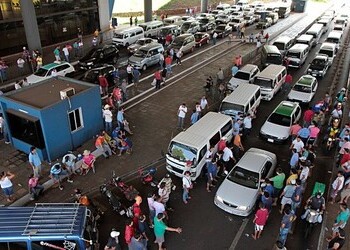Brazilian police have cracked down hard on contraband flowing into the country across the Friendship Bridge from Paraguay. But do such operations do anything to alter the factors behind the smuggling?
During an operation that concluded on September 2, police carried out strict customs controls on any cargo seeking to cross the bridge from Paraguay into Brazil’s southern state of Paraná. Streets surrounding the bridge were blocked and vehicles were searched while police enforced a regulation whereby individuals can only bring merchandise worth up to $500 into the country, according to Paraguayan newspaper, Diario Hoy.
SEE ALSO: Lake Itaipú – The Smugglers’ Paradise Between Brazil and Paraguay
The operation provoked immediate protests in Paraguay. In the border city of Ciudad del Este, motorcycle taxi drivers, truck drivers, and others whose jobs depend on cross-border trade expressed their anger. Some complained that Brazilian authorities had seized their vehicles and merchandise without cause and without warning, Diario Hoy reported.
The seizures around the Friendship Bridge marked the culmination of a three-month anti-contraband campaign, Operation Control Brazil (Operação Controle Brasil). Over these three months, similar campaigns took place in states bordering Bolivia, Paraguay, Argentina, and Uruguay, as well as along major highways connecting these areas to major Brazilian cities.
Contraband with a value of just under 1 billion reais ($190 million) was seized during Operation Control Brazil, including over 26 million packs of cigarettes, over 360,000 electronic cigarettes, hundreds of thousands of bottles of liquor, 178 tons of pesticide, and hundreds of firearms, according to a Justice Ministry press release.
InSight Crime Analysis
In recent months, Brazil has aggressively sought to curb cross-border contraband. But an important question remains: How successful can these operations be when the socio-economic factors that cause contraband to be so constant in Paraguay go unaddressed?
A combination of price differences, official corruption, and broad impunity has made the Tri-Border Area between Brazil, Paraguay, and Argentina one of the world’s busiest contraband corridors. Cigarettes, in particular, have been a cash cow for decades in Paraguay, with the small country being one of the world’s leading producers of illicit tobacco.
However, not all types of contraband are a luxury. While authorities have focused on alcohol, tobacco, and weapons, recent seizures on both sides of the border have included fish, chicken, and gasoline.
SEE ALSO: GameChangers 2020: How Black Markets Became the New Normal
Throughout the COVID-19 pandemic, black markets associated with contraband increasingly became a means of survival for millions. As legal industries shuttered due to travel restrictions or the inability to secure supplies, smugglers stepped into the breach. In Paraguay, essentials such as meat, sugar, fruit, and vegetables became hot commodities.
While Paraguay’s economy re-opened after the pandemic, the despair has not disappeared. Plenty of Paraguayans continue to rely on food bought on the black market. Chicken and beef producers in the country have reported that they are facing oblivion since their customers prefer cheaper, illegal imports from Argentina.
And with poverty levels continuing to rise in Paraguay, the demand for cheap contraband goods is not set to drop.

